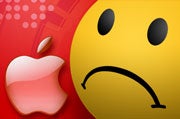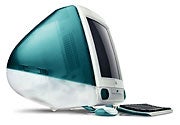10 Things We Hate About Apple
 It's high time we unloaded on the high-and-mighty Mac maker.
It's high time we unloaded on the high-and-mighty Mac maker.
Narasu Rebbapragada and Alan Stafford, PC World
The company formerly known as Apple Computer and now called simply Apple, Inc. is unique in many ways--including in its ability to drive even folks who admire it positively batty. It makes great products (usually), yet its secretiveness about them borders on paranoia, and its adoring fans can be incredibly irritating. Of course, its fans have to put up with some irritations, too: Simply being a member of the club still means you must endure unending jabs from the other side of the socio-political-techno aisle. But do they have to wear their suffering as a badge of honor?
Today, we--that's us, Narasu and Alan, veteran Mac users both--are going to get some stuff off our chests. We've enumerated ten things we hate about Apple (or its followers, or simply about the experience of using its products). But in the interest of fair play (not to be confused with FairPlay, Apple's DRM technology) we're also publishing another list--Ten Things We Love About Apple.
Use the Comment link at the end of this article to add your own gripes about Apple--or to defend it.
And so, with protective helmets in place, off we go:
1: Free Speech, Anyone?
Even if you're no Apple fan, this particular issue might not rise to the top of your own personal gripe list--but hey, we're journalists. So sue us.
Er, that's probably not the right turn of phrase to use, considering that in December 2004, Apple filed a lawsuit against the AppleInsider, O'Grady's PowerPage, and Think Secret Web sites for posting information about upcoming technologies that Apple had shared with outsiders under nondisclosure agreements. In the case of O'Grady, the news was of a FireWire interface for GarageBand. In the words of O'Grady himself: "yawn."
Apple pressured the sites to reveal their sources, and even worse, pressured the sites' ISPs. In May 2006, a California court said no way, ruling that online journalists enjoy the same First Amendment rights as "legitimate" offline journalists. Seems silly in today's world, doesn't it? Recently, the court ordered Apple to pay the sites' legal fees--about $700,000.
2. More Secretive Than Homeland Security
Those feds are secretive, but they're no match for Apple reps' infuriating stock answer: "We don't comment on future product plans." Being an Apple adherent means never knowing for sure if the shiny new MacBook or iPod you just bought is about to be rendered obsolete by a Steve Jobs keynote.
Of course, Apple is merely the most famous secretive Silicon Valley company, not the only hush-mouthed one. And tight lips make for explosive buzz when the company does decide to drop a bombshell. But contrast Apple's secrecy with Microsoft's lack thereof--Bill Gates, Steve Ballmer, and company love to talk about their company's upcoming products, and they still get their fair share of buzz. Even though many of those plans have a tendency to not actually come true.
3. Ain't Too Proud to Blame
When Apple shipped iPods containing a worm last year, instead of issuing a humble mea culpa, Apple took a swipe at Microsoft, saying, "As you might imagine, we are upset at Windows for not being more hardy against such viruses, and even more upset with ourselves for not catching it." As you can imagine, that didn't fly with security experts. How about an apology to the folks who were unlucky enough to buy the infected iPods, period?
4. iHate iAnything Apple first floated the idea of product names with a leading lowercase letter in 1994 with eWorld, an ill-conceived online service that went belly-up after a year and a half. But when it introduced the original iMac in 1998, it hit on a phenomenal success--and prompted hundreds of third-party manufacturers to follow with sickeningly cute Bondi Blue products with names that also began with a lowercase "i." Now dozens of Apple and third-party product names begins with "i." Their manufacturers are all jumping on the bandwagon, hoping that a single letter will sway us to buy their stuff. Meanwhile, you can't even start sentences with the products' names.
Apple first floated the idea of product names with a leading lowercase letter in 1994 with eWorld, an ill-conceived online service that went belly-up after a year and a half. But when it introduced the original iMac in 1998, it hit on a phenomenal success--and prompted hundreds of third-party manufacturers to follow with sickeningly cute Bondi Blue products with names that also began with a lowercase "i." Now dozens of Apple and third-party product names begins with "i." Their manufacturers are all jumping on the bandwagon, hoping that a single letter will sway us to buy their stuff. Meanwhile, you can't even start sentences with the products' names.
Is it any wonder that we're inclined to like Apple TV in part because it turned out not to be iTV? Or that we're kind of sorry that Apple was able to strike a deal with Cisco to share the name iPhone?



